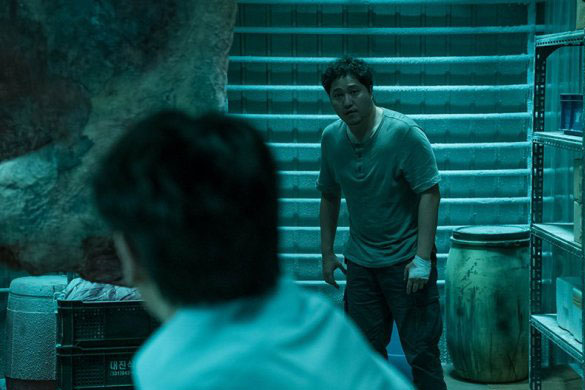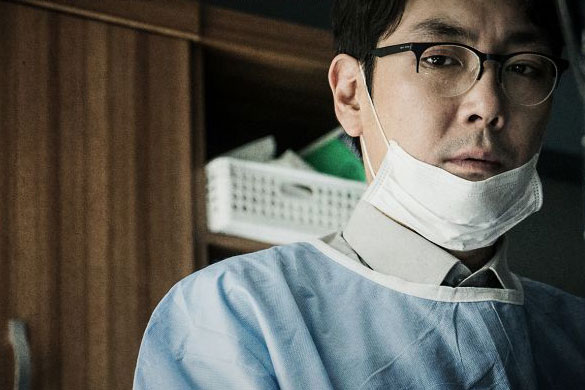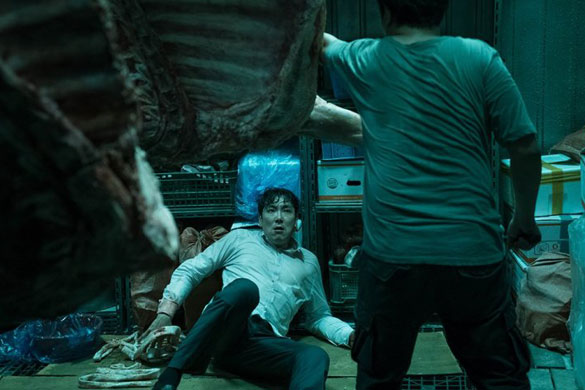"The first time is hard, after that it gets easier..."
Synopsis:
Seung-hoon (Cho Jin-woong) is a doctor who until recently ran a medical own clinic in Gangnam, an upmarket area of Seoul. However, when his business fails he is forced to take a job as a contract medic at a far less illustrious hospital located on the edge of the city. While carrying out one of numerous patient colonoscopies, on an elderly local man, Seung-hoon is shocked to hear him, while anaesthetised, rambling almost uncontrollably (and seemingly all too knowingly) about murder and a headless torso and with such a dismembered body recently having been discovered floating nearby in the Han river, Seung-hoon cannot help but increasingly believe that the old man and his son (Seung-hoon’s landlord) are in some way involved.
Soon after, Seung-hoon learns that his wife (Yoon Se-ah) has disappeared and without hesitation he decides it’s up to him to find out what really happened to her and prove the two men are responsible for her disappearance (and likely death), in spite of the fact that his personal life is falling apart and his mental state disintegrating...
Review:
As Bluebeard begins, audio of a broadcasted weather report is underpinned by a single wind instrument playing a haunting melody lying somewhere between melancholy and sombre while visuals slowly traverse a glittering cityscape. As the broadcast details the fact that recent warm weather has resulted in waterways normally frozen in winter thawing far earlier than usual, the camera pans down, down, down to an object floating in the Han river; an object that briefly rises on the ebb and flow of water to show itself to be a headless corpse.
Not only does this brief introductory scene point directly to the overall genre of the film we’re about to invest in without unnecessary exposition, pomp or circumstance, but it also deftly and subtly underlines one of Bluebeard’s most prominent, overarching commentaries. That is, that just as any bright and sumptuously architectured metropolis can outwardly hide darkness lying in its murky depths, the same can be said for society itself – smiles, outwardly calm and seemingly collected demeanours and indeed apparent professionalism all too often covering up lives in turmoil, blackened hearts and even deadly secrets.
In the early stages of the story, we see Seung-hoon performing a number of colonoscopies on various individuals. This is of course entirely necessary to familiarise viewers with the fact that all the patients make uncensored statements while sedated for the procedure - whether they be voiced subconscious thoughts and/or secrets or drug-induced ramblings – in the lead-up to the old man’s comments about the torso. In fact, some of the other patient statements are so off the wall (one middle-aged woman declaring “This is the first time I’ve had anal!” springs immediately to mind) that they deftly raise a question mark as to whether any of them can, or should, be believed or even entertained - adding further to the narrative's twists to keep viewers guessing in terms of what's real and what isn't.
Seung-hoon in his professional life only being shown performing colonoscopies could be said to fit with and underline the aforementioned overarching theme of dark and dirty (if you will) hidden within outward brightness but I really am in two minds as to whether visuals on operating room monitors that are clearly and repeatedly visible showing an anal probe moving through the rectum towards the intestines are entirely necessary. Sure, I admit they kind of accent the ‘dark and hidden’ theme yet further but I can’t seem to step away from seeing this imagery as little more than a gimmick specifically included to shock far more than underline anything thematically. Most people are pretty much aware of what a colonoscopy is but I question whether we really need to see it on screen, theme related or not.
 |
As was the case with the director’s 2003 debut feature, The Uninvited, Lee Soo-yeon goes to great lengths to deftly show the ongoing deterioration of Seung-hoon’s mental state within the context of the story, as his life crumbles around him. This also adds to the unpredictability of proceedings with viewers often (initially) unsure of whether what they’re seeing (a headless, female corpse hanging from a meat hook in a basement; Seung-hoon constantly coming across an ominous looking bag he’s convinced contains the missing head; etc) is in fact reality or just the increasingly violent delusions of a fractured mind. There are, perhaps, one too many instances where grippingly twisted scenes end with Seung-hoon waking with a start, showing his perceptions to have been yet more nightmares or delusions, but that really is only a minor niggle as the majority of ‘is it real or isn’t it?’ scenes work rather well even if pacing feels, at times, a little unbalanced.
It could even be said that the personal problems in Seung-hoon's life that cause his mental breakdown stand as a somewhat veiled implication that society itself is at least partly responsible for its own ills and the darkness that all too often pervades it, but whether one chooses to look that deep into the apparent narrative subtext is up to each individual viewer to decide.
Since the days of Memories of Murder, there has been an absolute plethora of serial killer films in Korean cinema, unsurprisingly. Some have been utterly exemplary, quickly becoming – or destined to become – classics of the genre (Memories of Murder; The Chaser; The Wailing; etc), others (Doctor, for example) have been less than original, to say the least. Bluebeard certainly didn’t set the Korean box office on fire, but Lee Soo-yeon’s knowledge of the horror genre and her accomplished infusing of elements of it within a fairly well thought out psychological thriller ensures that while the film may not be mentioned in the same sentence as the ‘best of the best’, it still largely succeeds where many have ultimately failed.
As a final note, for those of you who leave a cinema or hit an off button as soon as the credits begin to roll, be aware that there is a small coda scene in Bluebeard once the credits have ended. While this final scene does kind of feel like the standard horror trend of “You think the story’s over? Aha, but there is one more shock!”, it does expand the overall tale – at least somewhat – but I’d honestly have been just as content if the film had finished at the end of Seung-hoon’s character arc.
Summary:
Director Lee Soo-yeon’s 2003 feature debut, The Univited, showed her knowledge of both the horror and psychological thriller genres. In her second feature, Bluebeard, she infuses elements of both within a fairly well thought out serial killer tale. While Bluebeard may not necessarily be mentioned alongside the best of the best of the genre, it nonetheless largely succeeds where so many Korean serial killer films have failed, anal probes notwithstanding.
BLUEBEARD (해빙) / 2017 / Directed by Lee Soo-yeon
|




